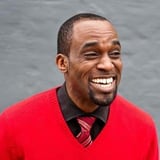Log in or create a free Rosenverse account to watch this video.
Log in Create free account100s of community videos are available to free members. Conference talks are generally available to Gold members.
Summary
How do we coordinate people for complex challenges? Certainly not with traditional work structures, designed to optimize for performance. Rather, we need new ways of working—new structures—that have been specifically designed to coordinate people for understanding. We'll look at a framework that can be used by teams, organizations, and other groups of humans working on complex problems. Stephen P. Anderson is a speaker and author who spends too much thinking about visual collaboration, how people learn, and board games; not necessarily in that order. Oh, and he’s on a mission: To make learning the hard stuff fun, by creating ‘things to think with’ and ‘spaces’ for generative play. This mission has led Stephen to MURAL, where he facilitates design strategy and innovation. Stephen's newest book, Figure It Out: Getting From Information to Understanding, has been described as both “required reading for designers and anyone else who needs to explain things” and a book that will “change the way you see the world.”
Key Insights
-
•
Complex problems differ fundamentally from complicated problems by involving unknown variables, shifting participants, and unclear success criteria.
-
•
Traditional top-down management structures often fail to coordinate people effectively on complex challenges.
-
•
Just enough structure—no more—is vital to prevent both chaos and rigid control when coordinating teams.
-
•
Cultivating shared language and standards is crucial; vague or specialized language can hinder true agreement and alignment.
-
•
Invisible environments like shared vision, mission, and values shape team coordination but must be actively lived, not just documented.
-
•
Designing visible environments—physical or virtual spaces—can shape group behavior and collaboration outcomes.
-
•
Psychological safety is foundational for teams to learn fast and innovate, emerging from deep listening, empathy, and interpersonal trust.
-
•
Accumulating multiple perspectives through drawing, analogies, and frameworks enriches understanding of complex challenges.
-
•
Adult development models explain why groups may act less mature than individuals, especially during frequent organizational resets.
-
•
Metaphors like gardening help in framing culture cultivation, emphasizing ongoing care, attention, and shared responsibility.
Notable Quotes
"All these traditional ways managers tell employees what to do probably don’t apply in complex problem contexts."
"We need just enough structure and no more to avoid chaos or stifling control."
"Until we clarify our language, we’ll agree on everything but not truly agree."
"Specialists would rather share their toothbrush than their language."
"The smartest person in the room is the room itself."
"Psychological safety isn’t created by an initiative but through a thousand tiny habits in language and behavior."
"If you want psychological safety, you have to start with self-awareness and deep listening."
"Teams often reset every 18 months and regress to infancy in trust and decision-making."
"A gardening metaphor fits culture better than cold, invisible icebergs because it highlights nurturing and growth."
"Drawing pictures together helps reduce interpretation and share perspectives effectively."
Or choose a question:
















More Videos

"Accessibility isn’t a checkbox you run automated tests for; you must involve people with disabilities to benchmark success."
Sam ProulxOnline Shopping: Designing an Accessible Experience
June 7, 2023

"We’ve had to retire the studio development category because it wasn’t prioritized due to project work demands."
Ignacio MartinezFair and Effective Designer Evaluation
September 25, 2024

"Stakeholders saw design as a slow-moving black box — exactly what we were trying to move away from."
Sarah Kinkade Mariana Ortiz-ReyesDesign Management Models in the Face of Transformation
June 8, 2022

"Companies today are embracing these principles, seeing the value of user connection and self-actualization for business success."
Daniel GloydWarming the User Experience: Lessons from America's first and most radical human-centered designers
May 9, 2024

"We spend millions on content that nobody wanted and that didn’t actually help people navigate their lives."
Patrick BoehlerFishing for Real Needs: Reimagining Journalism Needs with AI
June 10, 2025

"With proper prompting, AI can get you really close to a deliverable summary, much closer than expected."
Andy Barraclough Betsy NelsonFrom Costly Complexity to Efficient Insights: Why UX Teams Are Switching To Voxpopme
September 23, 2024

"Policy is ideally driven by values, while UX in the private sector is driven by delight and profit."
Alexandra SchmidtWhy Ethics Can't Save Tech
November 18, 2022

"Please don’t implement the Spotify model. It works for them, it won’t work for you."
Louis RosenfeldDiscussion: What Operations can teach DesignOps
November 6, 2017

"Every decision in a design system is like a puzzle piece; together they form a bigger picture that evolves over time."
Mitchell BernsteinOrganizing Chaos: How IBM is Defining Design Systems with Sketch for an Ever-Changing AI Landscape
September 29, 2021
















